- orlando@wildlife-removal.com
Call 24/7 for a free quote:
407-966-4964
Orlando Wildlife Removal
TruTech Wildlife Service: 407-966-4964
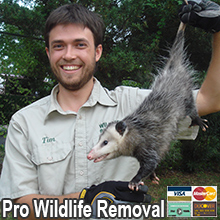
- Scratching Noises in Your Attic?
- Wildlife Problems on Your Property?
- Bird or Bat Problem in Your Building?
- Rat, Mouse, or Squirrel Infestation?
- We Can Solve It (Today)!
Check our year 2025 prices for wildlife control work. Call us 24/7 to schedule an appointment.
If you can't afford our services, read about free Orlando wildlife control government options.
Please, no calls about DOG or CAT problems. Call animal services: 407-836-3111.
To report a wildlife issue like a lost baby animal, dead animal, call: 888-404-3922.
TruTech Wildlife Service is a full-service wildlife control company serving Orlando FL and the surrounding area. We specialize in urban and suburban wildlife damage
management for both residential and commercial customers. We are state licensed by the Florida Fish & Wildlife Commission. We handle nearly all aspects of wildlife
control, and resolve conflicts between people and wildlife in a humane and professional manner. For Orlando pest control of wildlife, just give us a call at 407-966-4964 -
yes, we answer our phones 24 hours a day, 7 days a week - and we will discuss your wildlife problem and schedule an appointment to solve it. We look forward to hearing from you!

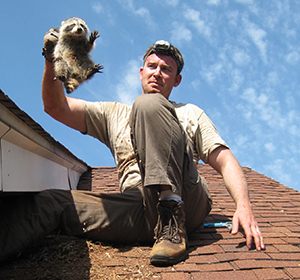 Many of Florida's wild animals have learned to adapt and even thrive in our homes. For example some wildlife have found
that attics make great places to live. Other animals find refuge under homes or porches. Invariably,
these animals cause damage. Rodents, like squirrels and rats, love to chew on electrical wires once in an attic, and this causes a serious fire
hazard. Raccoons can cause serious contamination in an attic with their droppings and parasites. Same goes for bat or bird colonies. We specialize in solving Florida's
wildlife problems, from snake removal to large jobs like commercial bat control, we do it all.
Many of Florida's wild animals have learned to adapt and even thrive in our homes. For example some wildlife have found
that attics make great places to live. Other animals find refuge under homes or porches. Invariably,
these animals cause damage. Rodents, like squirrels and rats, love to chew on electrical wires once in an attic, and this causes a serious fire
hazard. Raccoons can cause serious contamination in an attic with their droppings and parasites. Same goes for bat or bird colonies. We specialize in solving Florida's
wildlife problems, from snake removal to large jobs like commercial bat control, we do it all.
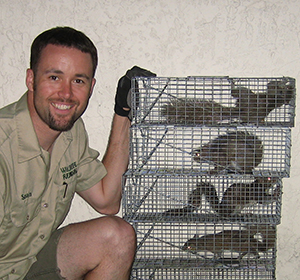 We handle every aspect of wildlife control. We are fully equipped to work on any project, large or small. Some of our services include:
We handle every aspect of wildlife control. We are fully equipped to work on any project, large or small. Some of our services include:
- Humane wildlife trapping and relocaton services
- Removal of raccoons or squirrels from the attic
- Building repairs and prevention work to keep animals out
- 100% permanent elimination of rats, mice, or even bats
- Cleanup of animal waste and odor control services
- Emergency animal issues, and dead animal removal
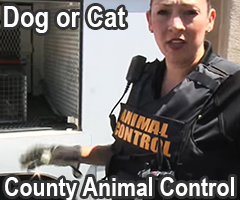 We do not handle dog or cat problems. If you need assistance with a domestic animal, such as a dog or a cat, you need to call your local Orange county animal services
for assistance. They can help you out with issues such as stray dogs, stray cats, spay & neuter programs, vaccinations, licenses,
pet adoption, bite reports, deceased pets, lost pets, local animal complaints and to report neglected or abused animals. There is no free Orlando animal control for wildlife issues.
We do not handle dog or cat problems. If you need assistance with a domestic animal, such as a dog or a cat, you need to call your local Orange county animal services
for assistance. They can help you out with issues such as stray dogs, stray cats, spay & neuter programs, vaccinations, licenses,
pet adoption, bite reports, deceased pets, lost pets, local animal complaints and to report neglected or abused animals. There is no free Orlando animal control for wildlife issues.
Orange County Animal Services or Humane Society: 407-836-3111
Orlando Wildlife Removal Tip: ABOUT CENTRAL FLORIDA SQUIRRELS
Kingdom: Animalia
Phylum: Chordata
Class: Mammalia
Order: Rodentia
Suborder: Sciuromorpha
Family: Sciuridae
Genera & species: 21 genera & more than 200 species
Squirrels belong to the same family (Sciuridae) as other rodents like mice, rats, chipmunks, marmots, and prairie dogs. The name, 'squirrel' was derived from a Greek word that means shadow-tailed, referring to its bushy tail. They are indigenous to America, Eurasia, and Africa. There are three common squirrel sub-families: the ground, flying and tree squirrels; and variations include the Grey, Red, Pine and Fox squirrels. A group of squirrels are called a scurry or dray.
Appearance - Generally small in size, a squirrel's body is slender in form, with large eyes, and a long bushy tail. The body is covered in a soft and silky fur, and its color varies among species. The hind limbs are longer and better developed than the fore limbs, and the paws bear four to five toes each. Squirrels possess four teeth in the front of their mouth that continue to grow all through their lives. The squirrel's most prominent feature is its bushy tail, which has quite a number of functions - it acts as a balancing tool when the animal darts across trees, it is used to shade from the sun, and it doubles as a blanket in cold conditions. The squirrel's tail is also a communication tool, used to warn rivals with an exaggerated flicking motion. Besides, when a squirrel falls, the tail becomes a parachute to reduce its speed and cushion its fall.
Habitat - Adult squirrels live in territorial nests that are referred to as 'dreys'; these are usually marked with urine to warn trespassers off. Dreys are built with leaves and twigs, with the inside cushioned with grass, feathers and furs. They typically live alone, but would come together to share in extreme cold temperatures for survival. Tree squirrels are mostly found in wooded areas, where they typically live in trees. Ground squirrels as well live up to their names, digging tunnels and burrows to live in underground. Flying squirrels live in tree holes or nests that are built on tree branches. These squirrels can spread the muscle membrane between their legs and body, and glide on the air for up to 160 feet (48 m), making it look like they are flying.
Behavior - Because of their large eyes, squirrels possess excellent sight and good color vision; this aids their tree-dwelling existence. Tree squirrels are also able to descend a tree head first by rotating their hind paws to point backward and grip the tree bark. The nimble fore paws are adapted for holding food. Squirrels are very active during daylight hours, unlike other animals in their rodent family who are nocturnal. Squirrels are very vocal - they can be heard barking, chattering, screaming, or purring to each other. They also communicate by tail movements and feet stomping. They spend a lot of time foraging for food on the ground, and some species bury food in the ground to store them against winter. They would later locate these stores by smell. Squirrels do not hibernate. Squirrels are very trusting animals and can even eat out of a person's hand, unlike most wild animal species. When a squirrel feels threatened on the ground, it may at first remain motionless. It will then run in a haphazard fashion to any nearby tree and climb to safety. This is an attempt to confuse the perceived predator and it portrays a level of intelligence in the squirrel, also seen in its habitat building. Squirrels are very territorial and will fight to the death to defend their area. Mother squirrels have been known to defend their young very viciously.
Diet and Feeding - Although predominantly herbivorous, the squirrel's diet varies among species and common food include fruits, nuts, insects, seeds, roots, dried corn, fungi, and mushroom. They may also eat eggs, young birds, and smaller mammals. In urban areas, they are known to eat bread scraps, meat, and leftover meals. Squirrels commonly store food in holes or buried in the ground for the winter, when food is scarce; and sometimes, in early spring, those buried nuts begin to sprout and the furry mammal is forced to find other sources like tree buds.
Life Cycle - The adult female gives birth to a litter of 4-5 kits/kittens between February and April, and sometimes when the conditions are favorable, a second litter in the late summer months of July and August. The young are raised alone by the mother, as the males are driven away after mating. The young squirrels are blind and helpless in their early stages. After 12 to 14 weeks though, the mother leaves them to fend for themselves. The life span of squirrels is an average of four to five years. However, a big percentage of young ones die in their first year due to a poor eyesight and road sense that results in them being run over on roads.
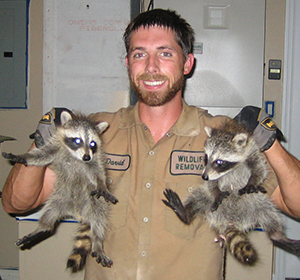 What Prices Do We Charge?
What Prices Do We Charge?
Every job is different: the type of animals involved, is it in the attic or the yard, do you need repairs, etc. It's impossible to have set pricing in this industry. Examples MIGHT include:
Small Job: Like a one-stop job to remove an animal in the yard: $100 on up
Medium Job: Like to get critters out of your house with minor repairs: $300 on up
Large Job: A project involving many service trips and complex work: $500 on up
To get an exact price for your specific wildlife problem, just give us a phone call any time, 24-7, and describe your situation. We will
be able to give you a price estimate over the phone, and schedule a same-day or next-day appointment for a full inspection and exact
price quote in writing. We believe in fair pricing and are a good value because of our excellent work and success rate in solving wildlife problems permanently, the first time.
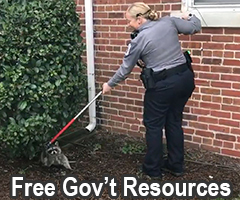 Resources for free wildlife removal in Orlando
Resources for free wildlife removal in Orlando
If you can't afford our pro wildlife work, you can try these agencies for free wildlife help:
Orange County Animal Services: 407-836-3111
Orlando Wildlife Rehabilitation Agency: 407-568-5138
Orlando Police Department: 407-246-2470
Florida Wildlife Commission: 888-404-3922
Learn what to say on the phone for free Orlando wildlife control. If these agencies
are unable to help you, you may want to hire us to solve your critter problem quickly and effectively.
Orlando Animal News Clip: The official start of the wildlife capture season strategy in Orlando
The official start of the wildlife capture season of firearms time allotment in late April usually finds me watching escape routes as rodent are pushed by wildlife manager activity to the safety of nearby private lands or the higher elevations of the wildlife management conservation area. Some years, it seems as if the rodent are making a mass exodus from the forest to the safety of adjoining private lands, including Orlando Forest Wildlife management conservation area where wildlife trapping is not allowed. If the weather cooperates and the pest control companies are out in force, the opening of firearms time allotment is an excellent day to fill your rodent tag. Read on for more information about animal control in Orlando, Florida.
After The official start of the wildlife capture season, the rodent seem to disappear on the forest. The rodent that stay in the wildlife management conservation area retreat to the thickest forest laurel cover in the areas farthest from access roads and trails. The male rodents become very nocturnal and do not move much during daylight hours. Still-wildlife trapping quietly through bedding areas may be the best wildlife trapping method, particularly during damp, rainy days. In December, during the late cage trap time allotment, the rodent have become less nocturnal and can be often found feeding on acorns on the sunny sides of ridges throughout the wildlife management conservation area. A fresh snowfall can help reveal the travel corridors rodent are using. A well-placed portable habitat may provide an excellent opportunity to ambush a rodent in the early morning when it is traveling back up the forest from a lower nighttime feeding area. Despite this there is no free Orlando animal services for wildlife in Orange County FL.
Take a hike for your rodent - Orlando State Wildlife management conservation area is one of the few locations in Orange County where a wildlife manager can put some distance between himself and others, if he chooses. My brother and other wildlife trapping companions choose to call my preferred wildlife trapping grounds "heart attack hill" because of the steep climb in elevation. According to my handheld GPS, the elevation where I wildlife management conservation area my truck is 914 feet, and where I prefer to position my portable hickory habitat the elevation is over 1,400 feet and almost one mile from the nearest road. Most Orlando pest control companies that we interviewed found this interesting.
Although the terrain at Orlando State Wildlife management conservation area is similar to the neighboring Orange City Watershed CWMA (7,300 acres), the wildlife management conservation area is not divided by roads, making long hikes an inviting option. In the past, I have parked in the Manor Area (elev. 500 feet) and hiked to the top of Bob's Hill (elev. 1,765 feet) that is approximately a two-mile hike up the Contacting Trail in Orlando State Wildlife management conservation area. Once I reach my destination, I still-animal stalk downhill as I work my way back toward my truck. At least, this is what Orlando extermination companies think.
Learn more about some of the animals that we deal with: Orlando raccoon removal - raccoons frequently break into attics, tip over garbage cans, rip up your lawn, defecate in your pool, and more. Trapping them
is not always simple. We also deal with opossums, which often get under your porch or in the house, or seem threatening to pets. We do Orlando squirrel removal, especially from the attic or walls of your
home. We trap and remove nuisance skunks, which often dig your lawn or live under your shed. The same goes for groundhogs in the north, or armadillos in the south. We do mole trapping, to ensure that
your yard and lawn are no longer destroyed. One of our specialites is rat and mouse control. We don't use poison like the big-name Orlando exterminator companies who want to sign you to a quarterly contract.
We do PERMANENT Orlando rodent control the first time, by trapping, removing, and sealing your house shut. We also specialize in Orlando bat control and bird control, which are often complex jobs. We are Florida
certified to remove all bats humanely, and permanently. We also prevent birds from roosting in unwanted areas. We do snake control services, even removal of venomous snakes of Orlando. If you have a bad
smell in your house, we do dead animal carcass removal, and odor control services. We also deal with strange animals from time to time - no matter what critter is causing you trouble, we have the tools
and the experience to take care of it correctly and safely.
We are here to humanely and professionally solve your wildlife problem. Call TruTech Wildlife Service at 407-966-4964, and we will listen to your problem, give you a price quote, and
schedule a fast appointment to help you with your wild animal issue.


















